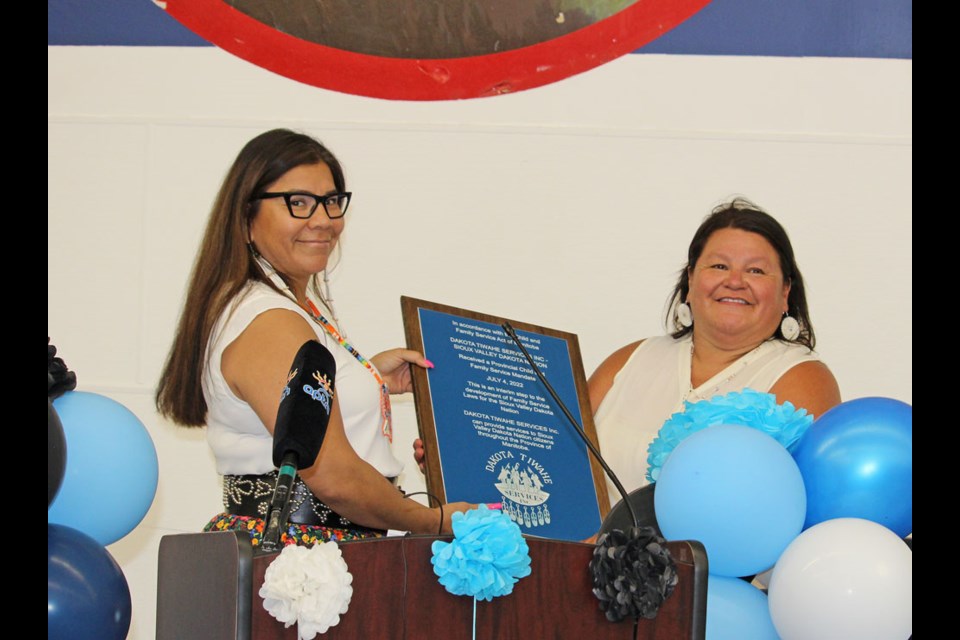History has come full circle in the month of July as Sioux Valley Dakota Nation takes responsibility for children in care (foster) seeking to retain the Dakota identity. Meanwhile the Pope has just visited Indigenous Peoples of Canada to apologize for abuse by church members. In the government/church run residential and day program schools, the underlying premise was to assimilate children into white society and erase ancestral identity.
On July 22, SVDN celebrated the handover of responsibility for children in care from Child and Family Services (CFS) to their own Dakota Tiwahe Services.
At the podium, Chief Jennifer Bone stated that Sioux Valley Dakota Nation is not signatory to a treaty. “We are proud of this as a sovereign nation as taught by our elders, we feel very strongly that Sioux Valley has inherent original rights as a non-signatory.”
She said the move from CFS to community-led service has been a long-standing priority with elders and leaders.
“Looking to the future, we are implementing change for our community. Dakota Tiwahe Services was created in 2018 to administer and provide the delivery of prevention programs to supplement the services provided by Dakota Ojibwe Child and Family Services.
“Sioux Valley Dakota Nation, through Dakota Tiwahe Services will provide culturally appropriate services….
“Our people need help and our approach is to assist them with wrap around service to strengthen our families, to support our members so our children can grow up with their families where they are safe, loved and connected to the Dakota way of life.”
Bone noted this is an interim provincial mandate for SVDN. “We know that it is responsible and prudent to work with the provincial entities while our law and system is being developed.”
She thanked the board of directors for the Dakota Tiwahe Services headed by Carol McKay-Whitecloud and acknowledged consultants and many other professionals who had input.
In a touching ceremony, 10 children in care were presented with handmade Star Blankets to remind them that they are not alone, but are loved and cared for by their community. From tiny children to tall teen boys, they came forward to accept their blankets, which will be sent to the other children of the community, also in care.
This colourful, well attended event in the Veterans Hall included people from several Dakota communities. A handful of speakers included Coun. Michelle Rosmus, and members of the DTS board of directors: Jenifer McKay, Knowledge Keeper Joyce Wasicuna, Carol McKay-Whitecloud and consultant Bobbi Pompana. From the federal government, Elizabeth Debicka, Acting Deputy Minister of Families enthusiastically congratulated SVDN.
Lawyer Harold Cochran was presented with a painting.
EARLY BEGINNINGS
Arlene McKay was one of several who worked to bring about the newly formed Dakota Tiwahe Services. She had formerly worked with CFS for some 10 years. “Working with Child and Family I found that we were starting to lose our language and I found that when we spoke Dakota to the people we worked with, they had a better understanding of what it is that was being asked of them.
“So, I changed my focus and career. I went back to school. I got a teaching degree to teach the language within our own school system.” She’s been teaching language on Sioux Valley for some years.
She says that since the 1970s the Sioux Valley community has been working toward taking care of their own children and not relying on CFS.
“Eva McKay, my mother, was part of the movement to take care of our own. That was where Dakota Ojibway Child and Family Services came from, but we still were under the provincial mandate of Child and Family Services, which wasn’t helping our people, because we’re of a different culture. Our kinship has strong family ties.” She explained that sisters and brothers consider each other’s children as their own.
Prior to Covid, McKay was on a committee that went through the provincial Child and Family Services handbook, section to section, sorting out what pertained to Dakota people, “revamping and revitalizing it according to our culture, our spirituality. We made it so that it was the way we understand to take care of our own.” It was a two-year project.



